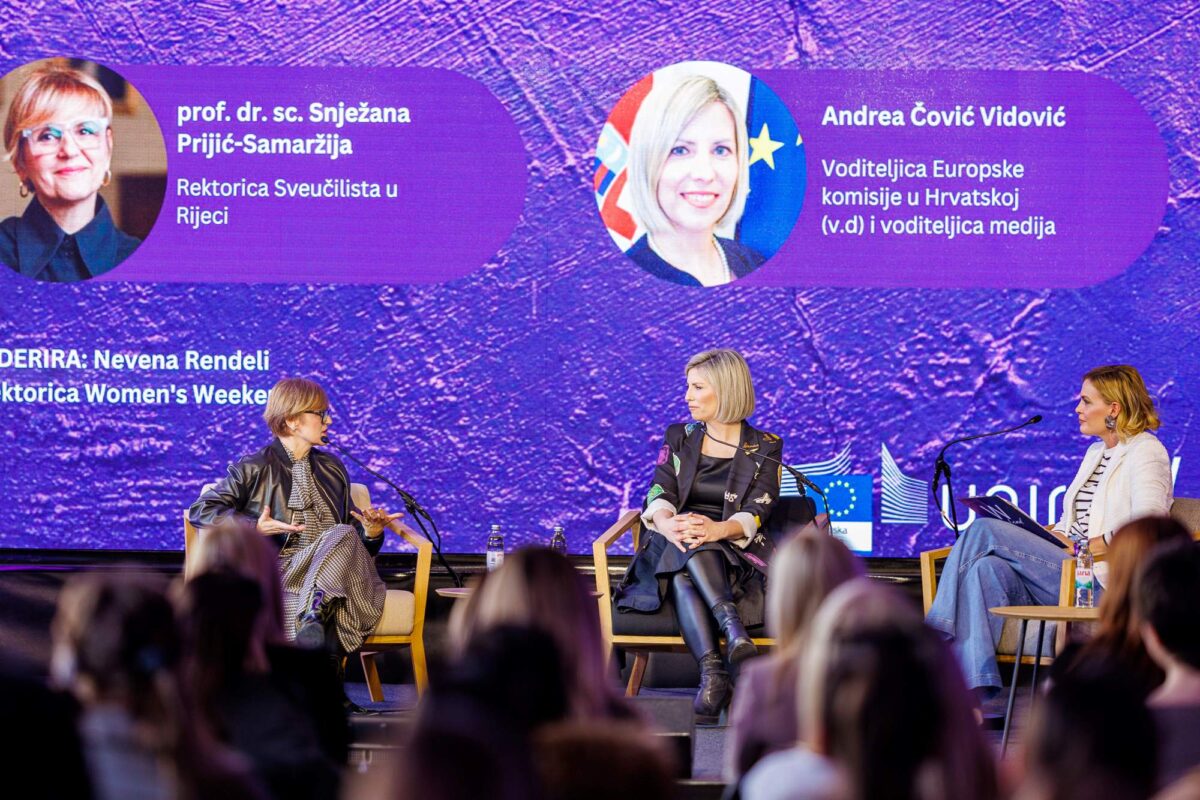Recognising the delicacy of gender equality achievements and their pervasive significance in today’s society, as well as the strengths and responsibilities of academic institutions in upholding democratic principles and practices, the University of Rijeka (UNIRI) firmly supports everyone’s right to have a voice and an opportunity.
With the implementation of the inaugural Gender Equality Plan for 2021-2025, the establishment of the first Gender Equality Council, and a wide range of activities and structural support actions designed to raise awareness and drive positive societal change, addressing gender inequalities will remain our ongoing challenge. UNIRI is committed to involving as many internal and external stakeholders as possible, cultivating a healthy organisational culture that values every member of the university community.
By nurturing the highest ethical principles and the idea of openness, the University of Rijeka has strengthened institutional foundations for equal opportunities and prevention of discrimination on any grounds, including gender, thus continuing its tradition set forth as early as 2003 with the adoption of the Code of Ethics. UNIRI was the first Croatian university to have a modern and comprehensive Code of Ethics with regular five-year reviews. In the past decade, a proud member of YUFE and AERUN communities UNIRI has built a strong strategic orientation towards being a young, student-oriented, non-elitist, open, and inclusive European university, and.
In May 2021, UNIRI became the first Croatian university with a Gender Equality Plan (GEP) for the period 2021-2025, adopted by the Senate as the highest decision-making body. UNIRI GEP, inspired and aligned with the ERA policy agenda on gender equality and the specific mandatory requirements and recommended elements of Horizon Europe, tackles 4 strategic areas to identify and implement policies and actions to correct gender biases and promote gender equality within the institution: a) institutional culture of gender equality, b) gender equality in scientific and artistic research, c) gender equality in teaching and training, and d) harmony of personal life and professional obligations, including prevention of gender-based violence. Being fully aware that the UNIRI GEP is a pioneering initiative of its kind in Croatia and the region, serving as a notable example and inspiration for other organisations, we have generously shared our experiences with universities and RPO organisations seeking to adopt similar measures. Just as crucially, in the course of these initiatives, we not only share our knowledge and experiences but also receive them with sincere gratitude, enriching our collective knowledge.
Upon GEP’s adoption, the first activities included the policy-level endeavors and the formalisation of the structural support system for GEP implementation, including the following UNIRI Senate Decisions passed in July 2021: Decision on the collection, recording, and processing of data disaggregated by sex, Recommendations for improving gender balance in appointments, and the Declaration on the use of gender-sensitive language.
As of 2021, UNIRI is also the supporting partner in the regional UNIGEM project (University and Gender Mainstreaming) that involves 19 universities from the region – Bosnia and Herzegovina, Serbia, Montenegro, and Croatia – and aims to enhance gender equality policies in higher education in these areas. UNIRI’s participation in the project stems from our dedication to pioneering and guiding practices, which have been effectively adapted by other universities to enhance their success. In addition to UNIGEM, several projects focusing on gender equality have been/are implemented at the university level, with notable projects including SPEAR, SHEFCE, and INSPIRE (as CoPs member).
To further emphasise UNIRI’s community engagement and participation in all spheres of life, the university has contributed to this year’s Women’s Weekend, a manifestation that gathers important names of the region and the world to connect and empower women. In collaboration with the European Commission Representation in the Republic of Croatia, we have organised the “For Europe of Gender Equality” program in Rijeka, marking the approach of International Women’s Day. The programme opened with a panel featuring Rector Snježana Prijić-Samaržija, Ph.D., and European Commission Representation Head in Croatia. The discussions underscored the critical state of gender equality, alongside a broader conversation on the gender pay gap, unequal caregiving burdens, and the strengths as well as challenges in progress towards equality in Croatia, and Europe. The programme delved into critical issues such as equal participation of women in business, gender equality within the legal framework, women’s financial independence, gender-responsive budgeting, the phenomenon of gender misinformation, and the pivotal role of academia in fostering gender equality. This comprehensive discussion set the stage for a rich dialogue, underlined by contributions from notable speakers including the University of Rijeka’s Rector, Professor Snježana Prijić-Samaržija, Ph.D., and distinguished ambassadors from Belgium and Canada, along with other esteemed representatives from the University and its faculties. The programme concluded with an inspiring presentation by Professor Danica Kragić Jensfelt, a leading roboticist and AI researcher from KTH, Sweden, and a member of the UNIRI’s International Scientific Council. In her speech about her journey, she underscored the importance of perseverance and innovation when confronted with challenges. This reinforced the conference’s overarching message of championing gender equality and our collective pursuit of an inclusive society. Further contributions to the event came from the University of Rijeka and its faculties, including Prof. Sanja Barić, Assoc. Professors Sanja Bojanić, Dalida Rittossa, Adrijana Martinović, and Ana Marija Sikirić Simčić, Ms. Daria Glavan Šćulac, and Assist. Prof. Brigita Miloš. From this, we derive a valuable lesson: while individual efforts are crucial, it is through our combined endeavours that transformative change is truly achieved










